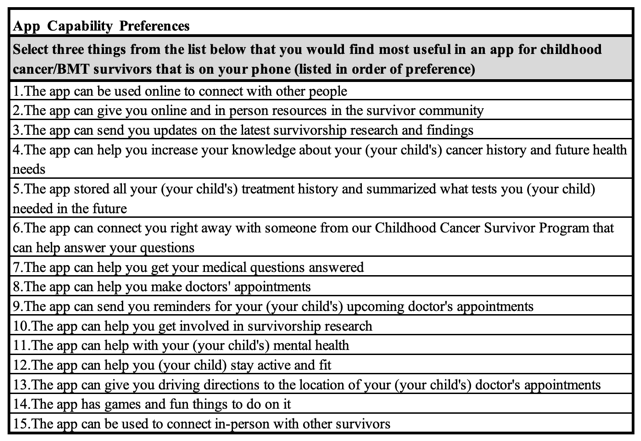Hematology/Oncology
Category: Abstract Submission
Hematology/Oncology I
332 - User Preferences for a Childhood Cancer Survivor Mobile Application: A Cross Sectional Survey Study.
Friday, April 22, 2022
6:15 PM - 8:45 PM US MT
Poster Number: 332
Publication Number: 332.113
Publication Number: 332.113
Eleanor Plaunt, University of Minnesota Medical School, Seattle, WA, United States; Svatava Merkle, University of Minnesota, Minneapolis, MN, United States; Jill Lee, University of Minnesoa, Minneapolis, MN, United States; Susan Flesch, University of Minnesota, Minneapolis, MN, United States; Char Napurski, University of Minnesota, Minneapolis, MN, United States; Karim Sadak, University of Minnesota Masonic Children's Hospital, Minneapolis, MN, United States

Svatava Merkle, MD
Resident
University of Minnesota
Minneapolis, Minnesota, United States
Presenting Author(s)
Background: The population of childhood cancer survivors (CCS) is growing, along with the number of CCS who will experience physiological and psychosocial late effects. CCS require long-term follow-up (LTFU) care and resources to increase their engagement, and ownership of health practices. CCS and their families have reported preferring an electronic or web-based educational messages. Mobile health (mHealth) interventions provide such a platform including the use of mobile applications (apps).
Objective: There is an urgent need to develop new ways of healthcare delivery that are compatible with modern technology and societal preferences. The Childhood Cancer Survivor Program (CCSP) at the University of Minnesota (UofM) sought to describe the preferences of CCS usage of a mobile application specific to their survivor-focused care.
Design/Methods: As a program evaluation quality improvement project, a cross sectional survey was conducted with 140 childhood cancer survivors (or their parents) of all ages (5-48) receiving care in CCSP at the UofM. Participants completed a survey through their routine clinical care at yearly appointments describing their preferences and expectations for a mobile application specific to their survivor-focused care. The survey included 9 items focusing on psycho-social care and care coordination created by review of the relevant CCS mHealth literature. The data collected were analyzed using descriptive statistics.
Results: Most participants (86%, 120/140) reported being very willing or willing to use an app on their phone that was specifically designed for CCS. Most survivors reported being very willing or willing to complete surveys (83 %, 116/140) and participate in research through an app (80%, 112/140). Survivors preferred to be contacted via text message (69 %, 97/140).Conclusion(s): CCS from a single institution academic medical center report being willing to use mobile health interventions (app) as part of their routine survivor-focused care. Such intervention could have impact on survivor engagement, ease the transition from childhood to adult models of care, improve survivor knowledge of late effects and skill building in self-management. Apps could serve as an accessible and trusted repository of psychosocial resources and ultimately become part of a program’s clinical research infrastructure. More research in implementation science is needed to assess the usability and feasibility of mHealth interventions for CCS.
App Capability Preferences Example of an item on the survey.
Example of an item on the survey.
Objective: There is an urgent need to develop new ways of healthcare delivery that are compatible with modern technology and societal preferences. The Childhood Cancer Survivor Program (CCSP) at the University of Minnesota (UofM) sought to describe the preferences of CCS usage of a mobile application specific to their survivor-focused care.
Design/Methods: As a program evaluation quality improvement project, a cross sectional survey was conducted with 140 childhood cancer survivors (or their parents) of all ages (5-48) receiving care in CCSP at the UofM. Participants completed a survey through their routine clinical care at yearly appointments describing their preferences and expectations for a mobile application specific to their survivor-focused care. The survey included 9 items focusing on psycho-social care and care coordination created by review of the relevant CCS mHealth literature. The data collected were analyzed using descriptive statistics.
Results: Most participants (86%, 120/140) reported being very willing or willing to use an app on their phone that was specifically designed for CCS. Most survivors reported being very willing or willing to complete surveys (83 %, 116/140) and participate in research through an app (80%, 112/140). Survivors preferred to be contacted via text message (69 %, 97/140).Conclusion(s): CCS from a single institution academic medical center report being willing to use mobile health interventions (app) as part of their routine survivor-focused care. Such intervention could have impact on survivor engagement, ease the transition from childhood to adult models of care, improve survivor knowledge of late effects and skill building in self-management. Apps could serve as an accessible and trusted repository of psychosocial resources and ultimately become part of a program’s clinical research infrastructure. More research in implementation science is needed to assess the usability and feasibility of mHealth interventions for CCS.
App Capability Preferences
 Example of an item on the survey.
Example of an item on the survey.